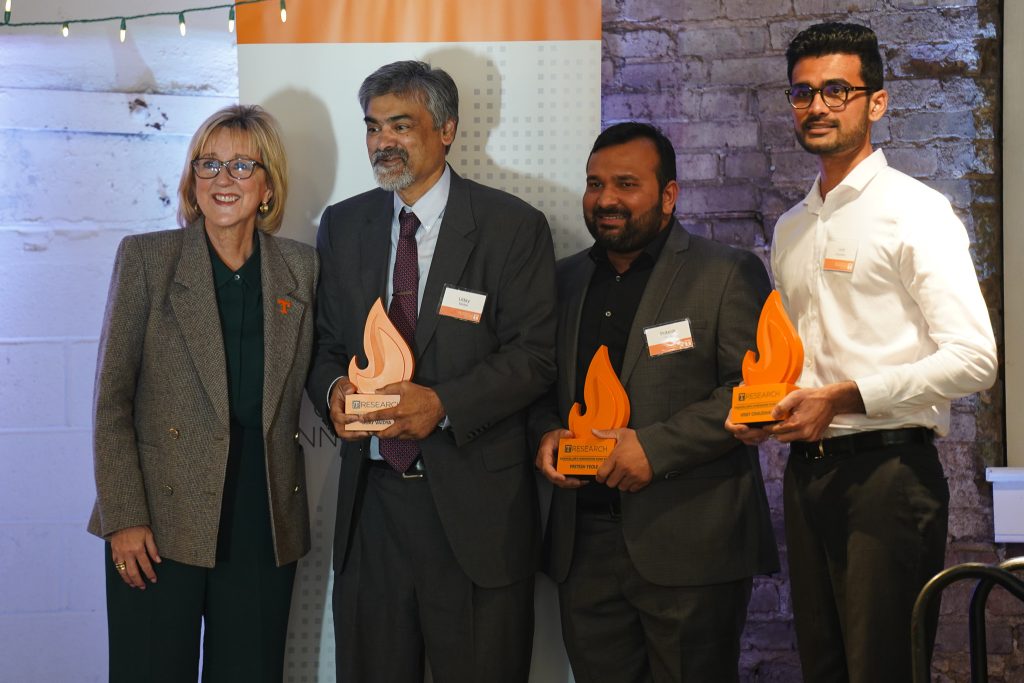
Aligned Composites Technology could be a key part of a carbon-negative future
Natural fiber composites, the focus of ACT, have aesthetic appeal and can be sourced locally, unlike synthetic fibers, which require extensive energy to produce and are far more expensive.
Vinit Chaudhary would describe himself as an “extreme extrovert.” He values interactions with people, building relationships, and learning about the lives and interests of others. It’s one of the reasons he is so excited to bring his start-up, Aligned Composites Technology (ACT) to market.
“I can’t wait to show people the transformative potential of our technology,” he said.
Chaudhary has been studying composites since 2018. He started as an undergraduate researcher at the University of Tennessee, Knoxville (UTK) under the highly esteemed Dr. Uday Vaidya. Upon graduation, Chaudhary was offered the option to continue with his master’s degree and help commercialize new non-woven composite technology.
“When I joined the lab as an undergrad, I had no idea what composites were,” he said. “Now, I’m the Co-founder of a company bringing the latest technology to the composite industry.”
Chaudhary credited Dr. Vaidya as being a strong leader, mentor, and guide as he navigates his entrepreneurial journey.
“Without him, none of this would have been possible,” Chaudhary said.
In early 2024, Chaudhary and Vaidya were one of five research teams at UTK rewarded with the inaugural “Chancellor’s Innovation Fund.” They received $50,000 to support the commercialization of their technology from the lab toward the marketplace.

A composite is a combination of two or more materials that, together, exhibit properties superior to those of the individual components. Composites are everywhere—found in cars, phones, bikes, trailers, boats, and more. Chances are, if you look around, you’ll spot something made from a composite material.
Fiber-reinforced Polymer composites (FRPs) are Chaudhary’s focus. At Aligned Composites they are developing specialty nonwoven and yarn intermediates with a large focus on natural fiber composites.
The potential for natural fibers such as flax and hemp is immense. These fibers have a remarkably high strength-to-weight ratio, often surpassing that of steel. If successfully commercialized, they could lead to widespread adoption of natural fiber composites across various industries, offering an eco-friendly alternative to synthetic fibers like carbon and glass.
“I was drawn to natural fibers because they are underutilized and offer incredible advantages,” Chaudhary explained. “They’re carbon-negative, biodegradable, renewable, lightweight, and provide excellent thermal insulation as well as vibration and noise damping properties. Plus, they have aesthetic appeal and can be sourced locally, unlike synthetic fibers, which require extensive energy to produce and are far more expensive.”
Additionally, this allows him to cross many different naturally occurring natural fibers for composites to discover new characteristics for various industrial and commercial applications.
“One example of a natural fiber we’re working with is inherently hollow, making it highly effective at sound dampening,” Chaudhary said. “This characteristic makes it an appealing option for industries where noise reduction is critical, such as automotive.”
In addition, Aligned Composites has tested hemp and coconut fibers both of which can be sourced from this side of the Atlantic. As Chaudhary continues his research, it has become evident that the applications of his technology are limitless.
“These can literally be used everywhere – in aerospace interiors, automotive parts, Marine, Sporting goods, defense, you name it. Through programs like Spark and Innovation Crossroads, we are continuously engaging in customer discovery efforts to narrow our focus on key industries while refining our business and financial models,” Chaudhary said.
He was selected as a participant for the 2024 cohort of Innovation Crossroads at Oak Ridge National Laboratory (ORNL), which also means he is a current participant in the Spark Cleantech Accelerator at UT Research Park at Cherokee Farms.
One of the unique advantages of Chaudhary’s continued close relationship with Dr. Vaidya and UTK is that they allow him to utilize lab space on campus for R&D efforts.
“Lab space can be a cost burden for start-ups, so the fact I have this support system is really rare and valuable,” he said.
Chaudhary is very motivated to mobilize his research and is thankful to be a part of the Innovation Crossroads program.
Connect with Vinit Chaudhary here.
Like what you've read?
Forward to a friend!

